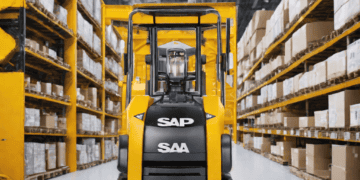In recent times, artificial intelligence has gained prominence within the FreightTech sector, capturing attention at industry events as stakeholders seek ways to optimize supply chain operations and reduce inefficiencies.
To address the evolving landscape of logistics and the potential disruptive changes it might bring, SAP SE, headquartered in Walldorf, Germany, has launched SAP Business AI at the Sapphire conference in Orlando, Florida. This solution, developed in collaboration with Microsoft, integrates with Microsoft 365 Copilot and Azure OpenAI, empowering customers to enhance their logistics capabilities and equip their workforce to tackle forthcoming logistical challenges.
SAP SE CEO, Christian Klein, highlighted the demand for SAP’s solutions in a world characterized by geopolitical tensions, shortages of products and skills, and emerging regulations. He emphasized SAP’s extensive experience, with 50 years of leadership in business software transformations and recent recognition as a leader in Gartner’s Magic Quadrant for Transportation Management Systems. Klein expressed confidence that the integration of AI into SAP software would bring substantial value to businesses.
SAP’s commitment to delivering user-friendly solutions is evident as they introduced the SAP Business Network for Logistics earlier this year. This offering allows global shippers to proactively address risk and respond swiftly to evolving regulatory requirements in areas like environmental, social, and governance reporting. Notably, Germany’s Supply Chain Due Diligence Act, which holds companies accountable for unethical practices within their supply chain partnerships, underscores the importance of this type of solution. Leveraging SAP’s Business Network for Logistics, shippers and carriers can promptly identify vulnerabilities and make real-time adjustments to ensure resilience as global regulations become more prevalent.
In addition to their logistics-focused solution, SAP also unveiled SAP Business Network for Industry. This AI-powered solution leverages data gathered from the company’s 80 largest customers, who collectively engage with over 250,000 trading partners in transactions exceeding $200 billion. Companies like Pfizer are utilizing this solution to prepare for future environmental audits and meet the increasing demands for sustainability reporting.
SAP recognizes that today’s AI technology is not solely aimed at solving present challenges but is being developed with an eye on the uncertainties of tomorrow. As Thomas Saueressig, SAP’s head of product engineering, stated, the company is dedicated to redefining enterprise software and future-proofing businesses in the age of AI, building upon decades of continuous improvement and innovation in collaboration with their customers and industries.
Stay current with supply chain report news at The Supply Chain Report. For international trade resources, visit ADAMftd.com.
#AIinFreightTech #SAPBusinessAI #Microsoft365Integration #AzureOpenAI #SupplyChainInnovation #GartnerLeader #SustainableLogistics #FutureOfLogistics #SAPBusinessNetwork #LogisticsTransformation















